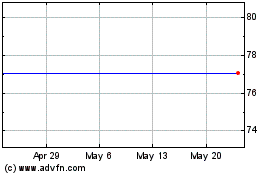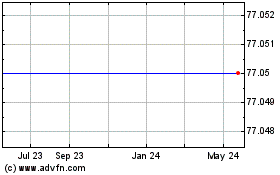Marriott Completes Acquisition of Starwood Hotels & Resorts
September 23 2016 - 12:10AM
Dow Jones News
Marriott International Inc. completed its acquisition of
Starwood Hotels & Resorts Worldwide Inc. on Friday, beginning
the complex integration process by linking the guest loyalty
programs and pledging to keep all 30 brands.
The $13 billion merger creates the world's largest hotel company
with more than 1.1 million rooms and about 5,700 hotels in more
than 110 countries.
"We think there are real advantages to size," said Marriott
Chief Executive Arne Sorenson.
Marriott estimates a costs savings of $250 million annually from
the merger. The Bethesda, Md., lodging company is betting that its
large size will allow it to negotiate better terms with online
travel agents like Expedia Inc. and to convince more travelers to
book directly on its website.
The merger combines Marriott brands like Ritz Carlton, Courtyard
and Residence Inn together with Starwood brands including W Hotels,
Westin and Sheraton.
But that size also offers challenges, like finding ways to
differentiate among the 30 brands—some of which compete against
each other—and merging the two distinct corporate cultures.
Many members of Starwood's best-in-class loyalty program have
been worried that the merger would water down their perks, which
include suite upgrades, personal concierge and complimentary
champagne.
Marriott said the two loyalty programs would remain distinct for
now and participants would be able to transfer points between the
two programs, which together comprise 85 million members.
Each would match the gold, platinum and other status of the
other program. But each member must transfer three Marriott points
for each Starwood point, a sign that Marriott values the Starwood
loyalty program more highly.
Marriott also has agreed to add three Starwood directors,
including its chairman, the real-estate executive Bruce Duncan, to
the Marriott board.
Mr. Sorenson said that other parts of the integration process,
such as combining technology platforms and deciding what offices to
close, could take one or more years.
"There's a lot to do," he said.
Starwood said in April last year that it was exploring strategic
alternatives, a move that opened the door for a sale. Marriott and
Starwood announced their plans to merge in November, but an
unsolicited offer from China's Anbang Insurance Group Co. earlier
this year sparked a tense bidding war. That contest ended in March,
when Anbang abruptly withdrew its $14 billion offer with little
explanation.
Mr. Sorenson said he thought his rivals would also look to grow
their companies through acquisition, but that it might not be so
easy to scale up as quickly as Marriott has.
"Companies like Starwood come up for sale only every few
decades," he said.
Write to Craig Karmin at craig.karmin@wsj.com
(END) Dow Jones Newswires
September 23, 2016 00:55 ET (04:55 GMT)
Copyright (c) 2016 Dow Jones & Company, Inc.
Starwood (NYSE:HOT)
Historical Stock Chart
From Feb 2025 to Mar 2025

Starwood (NYSE:HOT)
Historical Stock Chart
From Mar 2024 to Mar 2025
